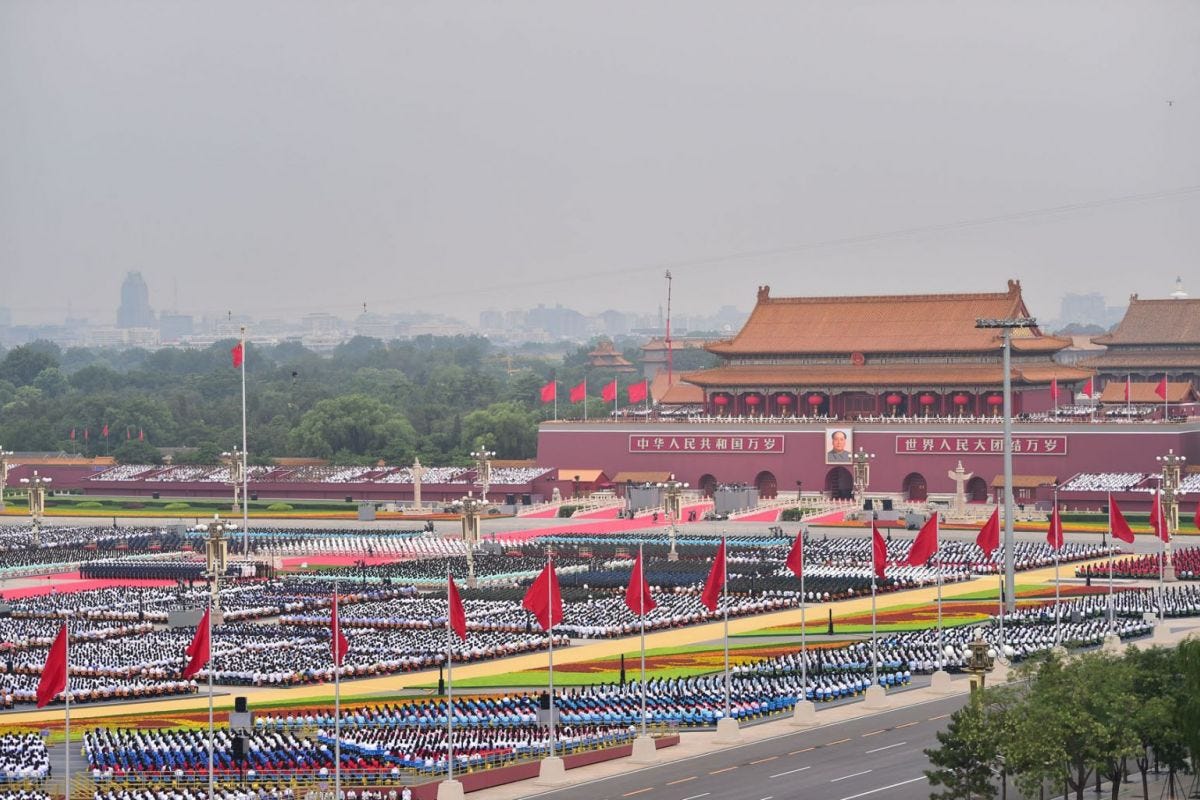I originally planned to write about a surprise art encounter at the Metropolitan Museum of Art last week. However, I decided to push that off until later this month to first discuss Chinese leader Xi Jinping’s recent July 1st speech celebrating the 100th anniversary of the establishment of the Chinese Communist Party (see Vol. 1, Issue 16). Why? Because the speech clearly tells us where China is coming from and where she aspires to go, and these are key to the potential future of cross-cultural relations between China and America (and also the world).
China’s Socialist Future
Xi Jinping, the leader of China’s state government, communist party, and military, gave an hour-long speech on July 1, 2021, commemorating the 100th anniversary of the establishment of the Chinese Communist Party.1 Standing with other leaders high on the Gate of Heavenly Peace overlooking Tiananmen Square directly above the giant portrait of Mao Zedong, President Xi alone wore a stylish gray Mao suit as he addressed 70,000 of his 1,400,000,000 people.
The speech was confident, proud, defiant, and heavily nationalistic, yet delivered in measured cadence. It included messages to the foreign community replete with warnings and threats. It included messages to his principal domestic audience. As regards the latter, the origin story of China’s present success was not subtle: the 95-million strong Chinese Communist Party and socialism are the inalienable linchpins that have brought China back to this mighty position in the world. China is the Communist Party, and the Communist Party is China.
As with any effective speech, there are words and phrases repeated throughout to emphasize the most salient points. In this speech (based on the official English translation), these include “struggle” (13 times, of which 4 are “tenacious struggle”), “journey” (14 times), “rejuvenation” (24 times, of which 19 as part of the phrase, “national rejuvenation”), “great” (48 times), “(Chinese) People” (88 times), and “(Communist) Party” (100+ times). Thus, struggle led by the Communist Party has resulted in the great journey of the Chinese people to national rejuvenation.
There is a short video with portions of the speech in Chinese embedded in this article.
To the domestic audience:
“Through tenacious struggle, the Party and the Chinese people showed the world that the Chinese people were capable of not only dismantling the old world, but also building a new one, that only socialism could save China, and that only socialism with Chinese characteristics could develop China.”
“To realize national rejuvenation, the Party has united and led the Chinese people in pursuing a great struggle, a great project, a great cause, and a great dream through a spirit of self-confidence, self-reliance, and innovation, achieving great success for socialism with Chinese characteristics in the new era.”
To the international audience:
“We will elevate our people's armed forces to world-class standards so that we are equipped with greater capacity and more reliable means for safeguarding our national sovereignty, security, and development interests.”
“On the journey ahead, we will remain committed to promoting peace, development, cooperation, and mutual benefit, to an independent foreign policy of peace, and to the path of peaceful development. We will work to build a new type of international relations and a human community with a shared future, promote high-quality development of the Belt and Road Initiative through joint efforts, and use China's new achievements in development to provide the world with new opportunities.”2
One linguistic turn of phrase that has been noted with particular interest is his use of a Chinese idiom and how it was officially translated into English. About three-quarters of the way through his speech, President Xi spoke 头破血流 (tóupòxuèliú) as the focus of a sentence. The literal translation is “head is broken and blood flowing.” It stands for battering and beating an opponent in combat. This idiom is forceful and unambiguous and would be unmistakable to the Chinese audience.
Yet, in the official English translation of the speech issued by the Communist Party, the phrase is quite different (see bolded below):
“We Chinese are a people who uphold justice and are not intimidated by threats of force. As a nation, we have a strong sense of pride and confidence. We have never bullied, oppressed, or subjugated the people of any other country, and we never will. By the same token, we will never allow any foreign force to bully, oppress, or subjugate us. Anyone who would attempt to do so will find themselves on a collision course with a great wall of steel forged by over 1.4 billion Chinese people.”
Though China significantly softened the phrase in translation, several English-language media sources, including the New York Times, presented a more literal translation of the sentence in question: “Whoever nurses delusions of doing that will crack their heads and spill blood on the Great Wall of steel built from the flesh and blood of 1.4 billion Chinese people.”
***
The big takeaway from President Xi’s speech is that China is a powerful country that is growing stronger. While many may and do passionately disapprove, her brand of governance has proven politically, economically, and socially viable as a counter-system to liberal democracy. The United States needs to accept this fact and work with this understanding to find new common ground with China. On the flip side, China also needs to accept the fact that its system is not the only viable system of governance and work with such an understanding to find new common ground with America (and others). It takes two partners to tango.
Carrots and sticks are a part of all geopolitical affairs, but mutual respect and awareness plus real compromise are necessary from both sides. One of the biggest challenges in the U.S.-China relationship will remain that although both countries often ostensibly use similar vocabulary, there is a wide disconnect between the meaning, intent, and desire behind the words. If this persists and positions continue to harden, building understanding and trust will be difficult.
China-U.S. relations are at a crossroads. I will be posting this article on Facebook as well and welcome discussing further with anybody who is interested in this timely conversation.
One More Thought
While it is not atypical for Chinese leaders to ditch their Western business suits for important State events, President Xi’s appearance during his July 1, 2021, speech in a finely-tailored, elegant Mao suit was still a striking visual.3
The Mao suit in Chinese is known as a Zhongshan Zhuang, named for Sun Yat-sen (Sun Zhongshan) who introduced it after the fall of the Qing Dynasty in 1912. It was adopted by Mao Zedong and became the official attire of China for much of the twentieth century.
The symbolism important in most everything Chinese has followed the Mao suit as well. It is said that the four pockets represent the Four Cardinal Principles of Chinese morality (propriety, justice, integrity, and shame), that the five front buttons represent the five branches of government enshrined in the Chinese Constitution (executive, legislative, judicial, control, and examination), and that the three cuff buttons stand for Sun Yat-sen’s Three Principles of the People (nationalism, people’s rights/democracy, and livelihood).
Follow Andrew Singer on Social Media: Instagram, Facebook, Twitter.
Xinhua photo from www.straitstimes.com (Xinhua via EPA-EFE)
Xinhua photo from www.straitstimes.com (Xinhua via EPA-EFE)
Xinhua Photo from www.scmp.com







